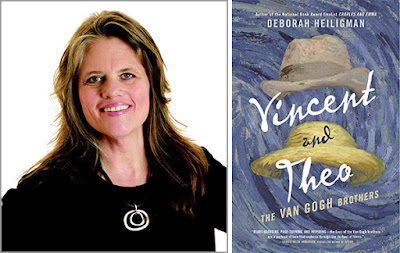Deborah Heiligman's latest book is the dazzling VINCENT AND THEO, but has many other incredible nonfiction titles to her name (try CHARLES AND EMMA—you will love it).
She is particularly drawn to narrative nonfiction for biographies, because life stories lend themselves well to narrative.
Deborah was thinking about her own theme in life. It's "only connect" by E.M. Forster. "I'm connecting, and I'm trying to connect the reader to someone I'm connecting with."
Her process is connecting to the person that she's writing about in the same way that fiction writers connect to the characters they make up. She's also completely obsessed with the way her subjects connect with each other.
"In biography, you want to get so in deep with the person than telling the story up close ... is the way to do it."
Deborah, who also writes fiction, has an analogy that explains the difference between the two disciplines. Fiction is clay, and you're shaping the story out of that medium. In nonfiction, you start with marble. The material is there, and you have to find the shape within it.
There is a misperception that nonfiction is like writing a book report or a dictionary entry. Our personalities show in the book that we're writing.
Deb wanders in the woods for a really long time, she said. "It takes me the longest time to really get it. Everything that I put in CHARLES AND EMMA had to be in service to the love story." She created a mantra for this book: It's a love story. It's a love story.
With Vincent and Theo, it was also a relationship book. But what was the relationship about? Most of her research is primary source research. She got "pissed off" very early on at Vincent. She wondered why Theo not only put up with him, but supported him emotionally and financially. That was a question she was trying to answer with the book. Her mantra, once again, became, It's a love story.
When you do a lot of research, you want to show it off. But that's not your job. Your job is to tell a story (something she learned from listening to Sara Paretsky). With Vincent and Theo, her additional mantra was, "You are telling a story. You are not a scholar."
Deborah's next book—due August 15 with her editor—is a WWII tragedy with a large cast of characters. It's an antiwar story. It's a helper story. And she is sure she will figure out the theme by August 15. (So am I. Deb is an absolute genius.)
Learn more about Deborah Heiligman here.


No comments:
Post a Comment